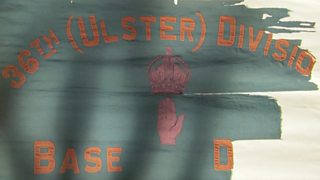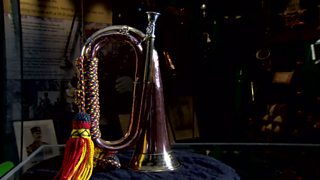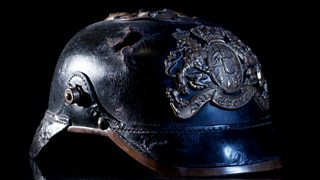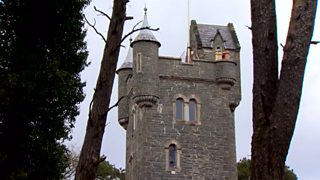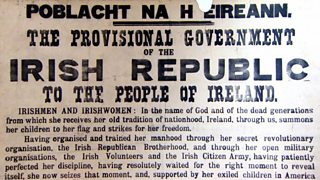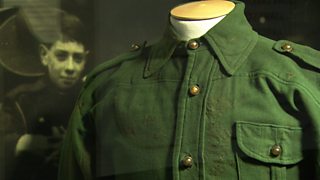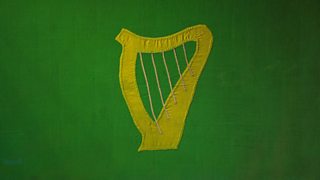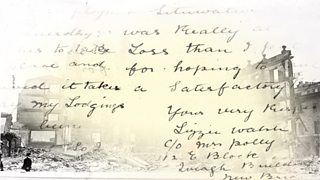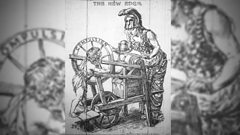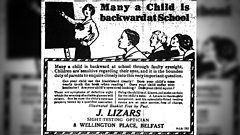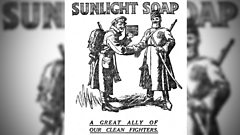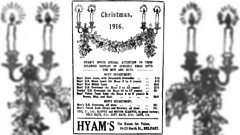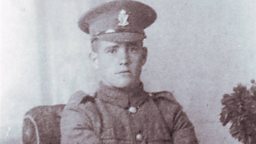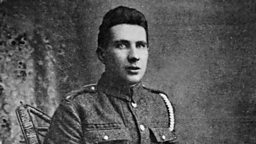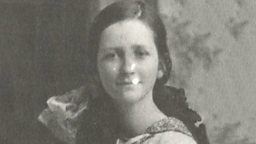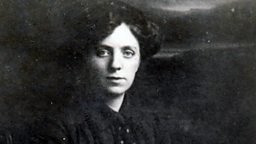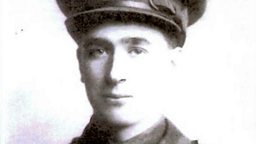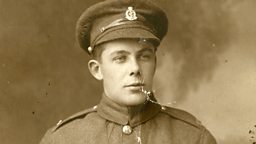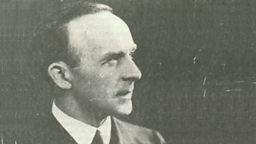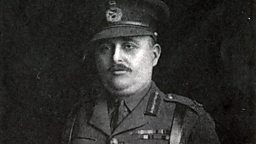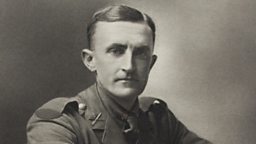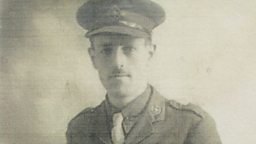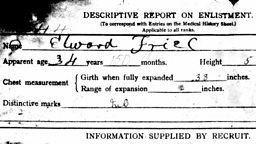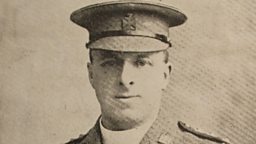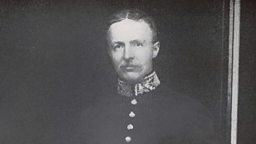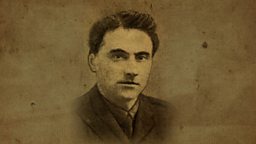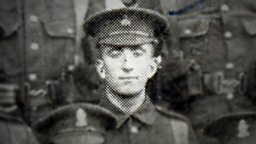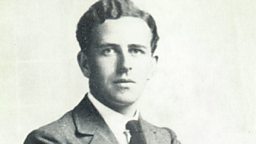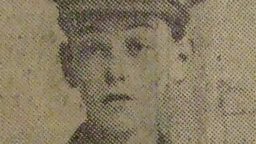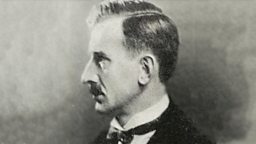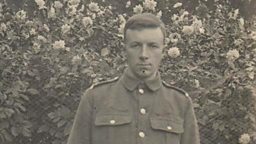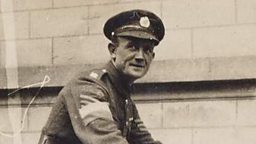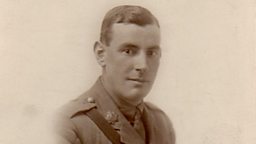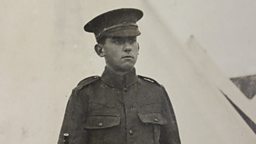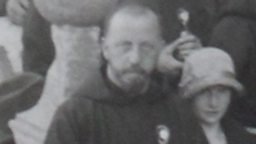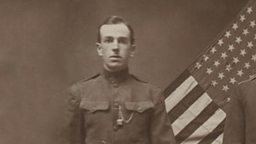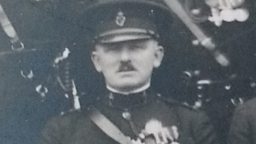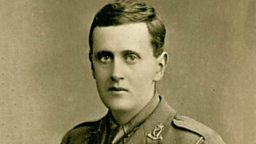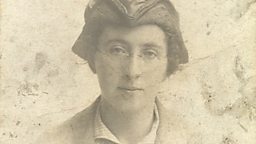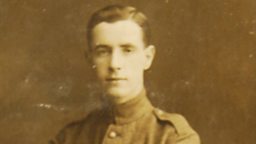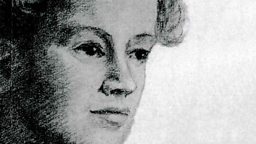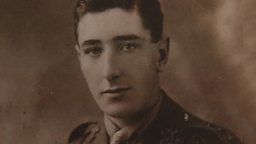Tom Kettle
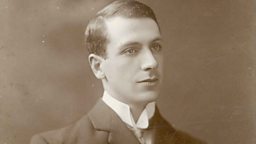
Orator, scholar, soldier
Thomas 'Tom' Kettle was a noted orator, academic, politician and writer.
The bombardment, destruction and bloodshed are beyond all imagination
From a strongly political, middle-class Catholic family, by his 30s he was a barrister, Professor of National Economics, and had previously been an MP for the Irish Parliamentary Party.
A committed constitutional Irish nationalist, he was a supporter of Βι¶ΉΤΌΕΔ Rule. With the issue coming to dominate Irish politics, the Ulster Volunteer Force was founded to resist Βι¶ΉΤΌΕΔ Rule. In 1913, the Irish Volunteers were formed to defend it, and Kettle became a member of its Provisional Committee.
As the Βι¶ΉΤΌΕΔ Rule crisis escalated in Ireland, Kettle stated in May 1914 that "there was no nation in the world that enjoyed freedom that was not organised to protect itself." He went to Europe that summer to buy arms for the Irish Volunteers.
There when war broke out, he stayed on, becoming a war correspondent for a short period. Witnessing the invasion of Belgium by Germany, Kettle became convinced that the war was a battle between civilisation and barbarianism. He believed that Ireland had a duty in defending the former "not only to herself but to the world."
Deeply interested in European culture, he thought "unless the war philosophy of Prussia is met ... the Europe of justice, honour and human charity is gone."
On his return Kettle volunteered and was commissioned a Lieutenant with the 7th Leinster Regiment. He threw himself into recruiting, and declared that he was "fighting for Ireland. We have agreed to lay all political questions under a moratorium ... Prussianism is the end of all small nations and Ireland has got to be defended on the Continent or not at all."
He also hoped, he wrote later, that the war might be the prologue to "the reconciliation of Protestant Ulster with Ireland, and ... of Ireland with Great Britain."
Then, in July 1916, Kettle went to serve in France with the 9th Dublin Fusiliers. Shortly after his arrival, he sent a letter to his wife Mary saying that war was a "grim and awful job", but also that it was "God's only way to justice." If he survived, he subsequently thought, he wanted to spend the rest of his life working for peace.
Thomas Kettle fought in the Somme offensive in September. The day before the Battle of Ginchy, he wrote that he was "desperately anxious to live ..."
But on 9 September 1916, during the fierce assault on Ginchy, he was shot and died. His body was never recovered.
Just days before his death, Kettle had written a poem to his little daughter Betty, "in the field before Guillemont", which concluded:
Know that we fools, now with the foolish dead,
Died not for flag, nor King, nor Emperor,
But for a dream, born in a herdsman's shed,
And for the secret Scripture of the poor.
(Taken from To My Daughter Betty, The Gift of God)
Bright star
Thomas 'Tom' Kettle was born in County Dublin in 1880 to mother, Margaret McCourt, and father Andrew, a prosperous farmer and land activist. With the founding of the Irish National Land League in 1879, Andrew Kettle had become one of its Honorary Secretaries. When Tom was still a small child, his father, a strong supporter of Charles Stewart Parnell to the end, stood for election for the Irish Parliamentary Party, and was imprisoned in 1881 under the Coercion Act.
Tom Kettle was educated by the Christian Brothers, at the O'Connell School in Dublin's North Richmond Street, and subsequently attended Clongowes Wood College, where he excelled.
Entering University College Dublin in 1897, Kettle proved a gifted speaker, and a key figure of his generation at university. He became auditor of the university's debating society, the 'L&H' (Literary and Historical Society), whose members included James Joyce.
After a period of ill-health, his wife Mary later writing that "over-study had strained his nervous system, and he never quite regained normal health", he travelled in Europe, his love of European languages and literature continuing all his life.
Kettle graduated in 1902 with a Bachelor of Arts degree in mental and moral science. He then studied law, entering the Honorable Society of King's Inns in 1903, and being called to the Bar in 1906.
Political career
Kettle had become President of the newly formed Young Ireland Branch (YIB) of the United Irish League in 1904. He founded The Nationist in 1905, a "weekly review of Irish thought and affairs", becoming its editor, with the assistant editor being Francis Sheehy-Skeffington.
Though the latter publication would last only six months, Mary, his wife, would later write in an introduction to Kettle's The Ways Of War that "these two events were the stepping-stones to his political career, and it was upon then that he came to the notice of the public."
Thereafter, in 1906, Kettle was asked to stand for election in the East Tyrone constituency for the Irish Parliamentary Party. Winning the election by a very narrow margin, he undertook a fundraising and promotional tour in the USA with Richard Hazelton, another young newly elected MP. They returned in 1907 after approximately six months.
Then, as well as speaking regularly in parliament on issues from Irish university education to women's enfranchisement to economics, in which he had strong interest, Kettle practiced law very sporadically. He also continued his academic interests, in 1908 translating and writing an introduction to Contemporary Ireland, by L. Paul Dubois.
Marriage and academia
In October 1909, Kettle was appointed Professor of National Economics at University College Dublin.
Just a month before, Kettle had married Mary Sheehy, having been a regular visitor to gatherings at the convivial Sheehy household during his time at university. Mary was a suffragist, and a YIB member, with a degree from the Royal University, having also studied at the École Superieure, Amiens.
Mary had two brothers, and was herself part of a notable sisterhood – Hanna, Margaret, Mary and Kathleen – in a family steeped in politics. The eldest, Hanna, achieved a first-class honours MA, and became a prominent suffragist and political activist; on marrying Francis Skeffington, the two joined names to become the Sheehy-Skeffingtons, and would be amongst the founders of the Irish Women's Franchise League.
Mary's father, David Sheehy, was now an Irish Parliamentary Party MP. As a young man, he had been a member of the Irish Republican Brotherhood, and was involved in the Irish Land League, being imprisoned several times for his part in land agitation.
For a time, Kettle combined his political and academic work, but in 1910, despite successfully holding his East Tyrone seat in January, he decided to resign as MP, and did not contest the December 1910 election.
Βι¶ΉΤΌΕΔ Rule
Over the next few years, as well as his university teaching, Kettle's publications would include The Day's Burden, a collection of his essays (1910); Βι¶ΉΤΌΕΔ Rule Finance: an Experiment in Justice (Dublin, 1911); and The Open Secret of Ireland, with an introduction by J. E. Redmond (London, 1912).
In his writings, Kettle consistently articulated his dedication to Βι¶ΉΤΌΕΔ Rule for Ireland. He described this in a European context in essays, believing, he wrote in his introduction to The Day's Burden (1910), that "if this generation has, for its first task, the recovery of the old Ireland, it has, for its second the discovery of the new Europe ... while a strong people has its own self for centre, it has the universe for circumference."
He stated, "my only programme for Ireland consists, in equal parts, of Βι¶ΉΤΌΕΔ Rule and the Ten Commandments. My only counsel to Ireland is that, in order to become deeply Irish, she must become European."
Two years later, his Open Secret of Ireland had an introduction from John Redmond, leader of the Irish Parliamentary Party. He reflected that "... nothing which Mr Kettle writes about Ireland can fail to be worthy of notice by everyone interested in the Βι¶ΉΤΌΕΔ Rule controversy ..."
In this publication, Kettle wrote that "... the Βι¶ΉΤΌΕΔ Rule idea has not only survived but waxed stronger in the wilderness. Time and events have altered its shape only to clothe it with a richer significance."
He hoped, he wrote, his work would "aid in humanising the Irish Question", and interpret a variety of its aspects. This included an examination of "the Βι¶ΉΤΌΕΔ Rule idea as a fundamental law of nature, human nature and government."
One chapter heading was entitled The Obviousness Of Βι¶ΉΤΌΕΔ Rule. In this, Kettle declared of Ireland: "What is it that she now claims, and on what grounds? She claims the right to enter into possession of her own soul ..." And, he continued, "you are certainly in love; suppose you were suddenly asked 'to state the case' for love? ... So it is with the Βι¶ΉΤΌΕΔ Rule idea."
His introduction to the book, Preliminary, dated December 1911, concluded: "If you think that Βι¶ΉΤΌΕΔ Rule is a little thing which must be done in a little way for little reasons, your feet are set on the path to failure. Βι¶ΉΤΌΕΔ Rule is one of those fundamental reforms that are not achieved at all unless they are achieved greatly."
Irish Volunteers
In 1912, the Third Βι¶ΉΤΌΕΔ Rule Bill for Ireland was introduced. This prompted fierce opposition, and the Ulster Volunteer Force was formed to resist Βι¶ΉΤΌΕΔ Rule.
A nationalist movement, the Irish Volunteers, was then created to defend Βι¶ΉΤΌΕΔ Rule. At its founding meeting at the Rotunda, Dublin, in November 1913, the manifesto stated it aimed to "secure and maintain the rights and liberties common to all the people of Ireland. Their duties will be defensive and protective, and they will not contemplate either aggression or domination."
Tom Kettle was subsequently appointed to the Provisional Committee of the Irish Volunteers, and became very involved in the movement, speaking at public meetings in its support.
At Ardee in May 1914, reported the Freeman's Journal, he said he believed that "we have won the constitutional game by all the rules of that game, and to defend her victory Ireland has created for herself a life-preserver and called it the Irish Volunteers."
He described the Irish Volunteers as "less a movement than an inspiration", and emphasised that its essence was "that it should have nothing to do with politics."
Kettle, the Freeman article stated, said that the Volunteers had "laid our cards on the table. All the world knows that we have no secret ..."
Volunteering was, said Kettle in the article: "... Ireland arming herself against any and all threats. It is Ireland saying to the enemies of her freedom and peace, 'Hands off'."
On the recent Arms Proclamation, which prohibited the importation of arms to Ireland save those to be used for 'unwarlike' purposes, he said, quoted the Journal, that "this veto, which forbids a responsible Irish citizen on the eve of Βι¶ΉΤΌΕΔ Rule to arm in self-defence is illogical, offensive and unsafe."
Kettle believed, the article stated, that "there was no nation in the world that enjoyed freedom that was not organised to protect itself."
A few months later, Kettle went to Europe in the summer of 1914. His purpose was to purchase arms for the Volunteers.
Then, he wrote in The Ways of War, published posthumously, "the outbreak of war caught me in Belgium, where I was running arms for the National Volunteers ..."
Kettle continued, "... on the 6th of August, 1914, I wrote from Brussels in the Daily News that it was a war of "civilisation against barbarians."
1914-16
War correspondent
Kettle remained in Belgium throughout August and September 1914 as a correspondent for the Daily News.
In a piece entitled Under The Heel Of The Hun, dated August 8th 1914, Kettle described how "the long trail of wounded has begun to wind its sorrowful way back to the capital."
He then wrote: "You say to yourself, as you hear all the world saying: C'est incroyable! It is not to be believed. It is a nightmare! And then the conviction shapes itself clearly, settles upon and masters your mind, that this German assault on civilisation has got to be repelled and utterly shattered once and for all."
Army lieutenant
After travelling the country, and describing the devastation he witnessed during the German invasion, Kettle returned to Ireland.
He was very keen to volunteer and fight in the war, later stating that "having come to understand the martyrdom of Belgium, I made up my mind that I would rather see this war through as a sixth-rate soldier than as a first-rate man of letters."
His initial attempts in this, however, were not successful. Aged in his mid-thirties, his health apparently caused concerns. He had, it appears, ongoing issues with alcohol during his life.
John Redmond, meanwhile, was urging the Irish Volunteers to join the British Army. The majority would do so, many to join the newly formed 16th (Irish) Division. A small minority disagreed, resulting in a split in the movement, and many of those who opposed subsequently went on to participate in the Easter Rising.
After some time, Kettle succeeded in becoming an officer. Dates given for this vary; the London Gazette records that he was commissioned as a temporary Lieutenant to the 7th Leinster Regiment on 15 December 1914, and transferred to the 9th Royal Dublin Fusiliers on 31 March 1915.
Kettle was reported, however, to have been working on recruitment campaigns with the 7th Leinster Regiment across 1915.
Recruitment speeches
On becoming an officer, Kettle became very actively involved in recruitment, making passionate speeches across the country encouraging men to enlist. These were frequently reported.
In January, the Freeman's Journal noted that Tom Kettle, at a Drogheda recruiting meeting in uniform, said he had last been there "in furtherance of the Irish Volunteer movement." Now, he went on, "although the domestic drama in which they were then engaged had been transformed into an European epic, the task was still the same. On the part of the Allies, and all the Allies, this was a war of defence."
Speaking of the "black desolation of Belgium ... as I saw it under the heel of the Huns", Kettle thought that "unless the war philosophy of Prussia is met in its monstrous challenge and broken, the Europe that we knew, the Europe of justice, honour and human charity is gone."
He rhetorically asked: "what are we fighting for? For my part, I am fighting for Ireland. We have agreed to lay all political questions under a moratorium ... The plain truth is that we are fighting for our very existence ... when once an invading force has landed, even the most central county in Ireland may find out very quickly that it is not such 'a long way to Tipperary' after all ... Prussianism is the end of all small nations and Ireland has got to be defended on the Continent or not at all."
In February, Kettle was speaking at Kells, reported the Freeman’s Journal, asking, "was there any argument, indeed, about the war? Was there ever in all history a clearer case between justice and bullying?"
Making a special appeal to the National Volunteers, he continued, "to them I have a right to speak, because I have been associated with their movement from the beginning. We started the National Volunteers to defend the liberties of Ireland. Well, if you are engaged in a work of defence you must carry that out at the proper theatre, and the proper theatre – the place where the issue is now joined – is not in Ireland but on the plains of France and Flanders."
Kettle had growing hopes, he said, that "just as Russia, France, and Belgium formed amidst the waste and wreckage of war the precious jewel of national unity, so might they also in Ireland." He also hoped "that when Catholic and Protestant have soldiered together, that they may find something better to do with their lives when they come back than spend them in quarrelling."
In March, the Freeman's Journal reported that Kettle was at Dundalk, saying: "They were on the side of England, because England was on the side of God. They were on the side of Belgium, because the sacredness of treaties and the existence of little nations were at stake. They were fighting the people’s war for the people's peace."
'Go and fight for Ireland'
Kettle's recruiting work continued into the summer of 1915. In July the Irish Times reported on a meeting in Pettigo, where "Lieutenant Kettle said that this was his one hundred and seventy-fourth speech at recruiting meetings to endeavour to bring home to people the reality of this war. The British and the Allies were fighting for civilisation and against everything that was foul in Germany ... The man that would not go and fight for Ireland was either a fool (not usual in Ireland), a coward, or one who regarded life as a comic opera."
By August, Kettle was speaking at a recruiting meeting in Kingstown, where the new Royal Dublin Fusiliers camp was being opened. Given a "hearty reception", noted the Freeman's Journal, Kettle went on to say that "he cared for liberty more than he cared for Ireland. If he saw Ireland following the path of dishonour he would say that she had forgotten her traditions."
Kettle continued, the article states, by declaring that "he thanked God that in the great crisis of Europe, their Leader, Mr Redmond, with a noble gesture, forgave England for all the sins in the past, and gave all the weight of Ireland upon the side of the Allies in the war."
Kettle believed, the Freeman's Journal reported, that "as far as he was concerned, he was most definitely not fighting for England, and he was not asking anybody there to fight for England. She was big enough to fight for herself ... He was not fighting for the Colonies, and he did not ask them to do so. The Colonies were fighting for themselves. He was fighting for, and he asked them to fight for, Ireland."
As the year was coming to a close, noted Lieutenant-Colonel FE Whitton in the regimental history of the Leinster Regiment, the 7th Battalion departed for France.
Meanwhile, Kettle's recruitment work was still ongoing, taking him to England: "At the end of November [1915] lists were definitely compiled of those who were to accompany the [7th] Battalion overseas and it was with great regret that quite a few who were unfitted for service overseas departed to put in useful work in other spheres. Lord Fingall left to take up recruiting work in Drogheda; Lieutenant TM Kettle went to Newcastle-on-Tyne on a recruiting mission ..."
'Ireland was my centre of reference'
Kettle faced criticism, he said, for his recruiting work.
Speaking in Dundalk in 1915, reported the Freeman's Journal, he said he "had been accused of being a recruiting sergeant. Well, he was proud of the title. He had a portmanteau of letters of abuse, mostly anonymous ..."
Later, writing in 'Why Ireland Fought' in his book The Ways Of War, Kettle described how "it has been charged against us who have taken our stand with the Allies that we were merely dancing to the tune of Imperialism ..."
Kettle believed that "our recruiting appeals have been twisted from their plain utterance and obvious meaning. Wordy young men, with no very notable public services to their record, have 'stigmatised' (a word in which they delight) us all from Mr Redmond down as renegades to Irish Nationalism. What we have said and done is to be remembered and is to rise up in judgment against us in the new Ireland that is coming."
He wrote, "I do not know whether anyone else is pained or alarmed, but my withers are unwrung. Since I knew Prussian 'culture' at close quarters I have loathed it, and written my loathing."
He had, he noted, "assisted for many weeks at the agony of the valiant Belgian nation." In so doing Kettle had, he stated, written "no word and spoken none that was not the word of an Irish Nationalist ... Ireland was my centre of reference ..."
"It is true", he wrote, that he and others had "assumed that Ireland had a duty not only to herself but to the world; we assumed further that, whatever befell, the path taken by her must be the path of honour and justice."
He believed of Ireland that, "to counsel her to stand neutral in action would have been to abandon all her old valour and decision, and to establish in their places the new cardinal virtues of comfort and cowardice. In such matters you cannot compromise."
And, stated Kettle, "used with the wisdom which is sown in tears and blood, this tragedy of Europe may be and must be the prologue to the two reconciliations of which all statesmen have dreamed, the reconciliation of Protestant Ulster with Ireland, and the reconciliation of Ireland with Great Britain."
Easter Rising
At the outbreak of the Easter Rising in Dublin, Tom Kettle was in Dublin with his family, on leave from the barracks in Newbridge where he was stationed.
Mary Kettle later wrote that her husband found that Easter week 1916 "had been for him a harrowing and terrible experience."
During it, Francis Sheehy-Skeffington, pacifist, civilian and Mary's brother-in-law, was shot with two others by firing squad under the orders of Captain John Bowen-Colthurst. For this, in June 1916, the Captain would be court-martialled and found guilty but insane of their murders.
Kettle had personally known leaders of the Easter Rising, like Patrick Pearse and Thomas MacDonagh, and, his wife believed, "what really seared his heart was the fearful retribution that fell on the leaders of the rebellion."
Kettle gave evidence on behalf of Eoin MacNeill, who had tried to countermand the Rising, at his court-martial in May 1916. MacNeill was found guilty of charges of attempting to cause disaffection among the civil population, and of acting in a way likely to prejudice recruiting.
Mary Kettle noted, however, that her husband had had no sympathy with the rebellion: "... indeed it made him furious. He used to say bitterly that they had spoiled it all – spoiled his dream of a free united Ireland in a free Europe."
After the Easter Rising, Kettle has been quoted as saying: "These men will go down to history as heroes and martyrs, and I will go down – if I go down at all – as a bloody British officer."
Active service
To the front
In summer 1916 Kettle, who had remained very keen to see active service, was sent to France. He departed on 14 July 1916 with the 9th Royal Dublin Fusiliers, one of the battalions in the 48th Brigade of the 16th (Irish) Division.
As Second-in-Command of 'B' Company, 9th Royal Dublin Fusiliers, Kettle served in the Hulluch sector to the end of August 1916.
Just days after his arrival, he wrote to his wife of his initial reactions: "... It is a grim and awful job, and no man can feel up to it. The waste – the science of waste and bloodshed! How my heart loathes it and yet it is God's only way to Justice ..."
On 24 July 1916, he had had, he told Mary, "... the afternoon of my second day in the fire trench. My ears are becoming a little more accustomed to the diabolism of sound, but it remains terrible beyond belief."
That morning, the Germans had dropped "a mine right on top of our dug-out. Nobody was hurt, thank God. The strain is terrible. It continues from hour to hour and minute to minute. It is indeed an ordeal to which human nature itself is hardly equal."
But, he noted, "what impresses and moves me above all is the amazing faith, patience and courage of the men. To me it is not a sort of looking-down-on but rather a looking-up-to appreciation of them. I pray and pray and am afraid! – they go quietly and heroically on. God bless them and make me less inferior to them ..."
'Responsibility of an officer'
Kettle again wrote, in a letter to Brigadier-General Hammond in July 1916, of that he thought the men remarkable: "What has moved and impressed me most, I think, is the spirit of the men and their confidence in their commander. Courage, or rather heroism, is the commonest commonplace to them. If I live longer with them I shall begin to get near their standard."
Kettle told Hammond that he found it "... an amazing experience this living on a lease renewable from hour to hour or even minute to minute. If I come through, which in my individual case is doubtful enough, I will assuredly face life in a new way."
Of being an officer, Kettle wrote in another letter to the Brigadier-General on 28 July 1916 that: "There are a great many things I do not know and a great many qualities I lack, but I can get on with Irishmen and keep them in good temper. Moreover, the responsibility of an officer is not so great as I thought. The men expect you to be like a man, they do not expect you to know everything like the ideal subaltern of the silly text-books."
"I am happy too in a sort of a way that, knowing what was ahead, I had the grace - I won't say the courage – to do my duty ..."
He noted: "... lest you should think that my nerves are exaggerating the random way in which death comes, I should say that two young officers in the lines in which we are this afternoon have already been killed ..."
And Kettle continued to think of Ireland: "For myself, I am certain that unless justice comes to Ireland, England will not win this war, and is not worthy to win it."
He concluded by writing that all was not seriousness at the front: "... don't think we are glum. We have the reputation of being the gayest company in the battalion and I personally have spent much of time in writing comic verse!"
'The wall-paper war'
Kettle's writings at the front included reflections on the actual experience of serving, later posthumously published in Ways Of War.
In an article in the book entitled The Long Endurance, Kettle wrote of the "intimate and crushing fatigue of the actual man on the spot", and described his feelings that "this, the greatest, is also the dullest of all recorded campaigns."
Calling it "the Wall-paper War", he explained this was because it had "everywhere the same type and development of fighting, the same pattern repeated and indefinitely repeated."
Kettle considered, "there may very well be units of this immense army that on their return home will have apparently little to show for their lost blood." He believed the "long endurance" would eventually come be seen as "an essential element in the slow and great victory." But, he noted, "in the trenches it is the same day-by-dayness that tells and tries."
In trying to "image this whole task of holding the line", Kettle wrote in the piece that he saw the sentry-group as a symbol. Within the group, he described the experience of "a figure in khaki ... as he peers through the night towards the German lines":
"Over there in front across No Man's Land there are shell-holes and unburied men. Strange things happen there. Patrols and counter-patrols come and go. There are two sinister fences of barbed wire, on the barbs of which blood-stained strips of uniform and fragments more sinister have been known to hang uncollected for a long time."
Describing the physical difficulties, Kettle continued: "The air is shaken with diabolical reverberations; it is stabbed with malign illumination as the Véry lights shoot up, broaden to a blaze, and go out. The contrast of night and light and gloom is trying to the eyes. The rifle-grenades and trench-mortars, flung at short range, that scream through the air are trying to the ears ..."
Other men, not on sentry duty, "may seek shelter. But not he. Strange things issue from No Man's Land ... And so, strained, tense and immovable he leans and looks forward ..."
Kettle concluded: "But the trench has not fallen. As for him, he carried his pack for Ireland and Europe, and now pack-carrying is over."
"He has held the line."
On the move
By mid-August, Kettle's heath was frail. He continued to write to his wife of his hope that he would survive, and devote his skills towards fostering understanding: "If God spares me I shall accept it as a special mission to preach love and peace for the rest of my life ... I want to live, too, to use all my powers of thinking, writing and working to drive out of civilization this foul thing called war and to put in its place understanding and comradeship ..."
At the end of August 1916, the 9th Royal Dublin Fusiliers was on the move to the Somme sector. This was in preparation for an attack on the village of Guillemont by the British Fourth Army, in conjunction with the French, which was to begin on September 3rd, 1916.
For the assault, said Operation Order 56 of the 48th Brigade, the XIV Corps was to clear Guillemont, with the attack being carried out by the 5th Division on the right, and the 20th Division on the left.
During this operation, the 47th Brigade of the 16th (Irish) Division was to be attached to 20th Division. The rest of the 16th (Irish) Division was to be in Corps Reserve ; this included the 9th Royal Dublin Fusiliers, as part of 48th Infantry Brigade. The latter was to be "ready to move at one hour's notice", said the 48th Brigade's Operation Order.
The 9th Royal Dublin Fusiliers' Battalion War Diary records its journey to the front line: entraining from Chocques on 29 August, detraining on 30 August at Longeau, and undertaking "a very wet and tiring march" to reach Corbie. Next day the Battalion marched off at 11.10 am to arrive at the 'Sand Pit' at 5.30pm.
There, on September 1st and 2nd, the men spent time improving bivouacs and on parade; the Battalion War Diary says they "practised the attack in waves."
'My heart cries for you'
The 9th Royal Dublin Fusiliers Battalion War Diary states that the men moved early in the morning on the 3rd September to bivouacs at Billon Farm.
Tom's last letter to his wife was written on that day. With the Battle of Guillemont about to begin, he told Mary: "The long expected is now close at hand. I was at Mass and Communion this morning at 6 o c, the camp is broken up, and the column is about to move ... Many will not come back."
"Should that be God's design for me you will not receive this letter until afterwards. I want to thank you for the love and kindness you spent and all but wasted on me. There was never in all the world a dearer woman or a more perfect wife and adorable mother. My heart cries for you and Betty whom I may never see again ... If the last sacrifice is ordained think that in the end I wiped out all the old stains. Tell Betty her daddy was a soldier and died as one ..."
'To my daughter Betty'
Guillemont was successfully taken in the assault, but at a heavy cost. The War Diary of the 47th Brigade entry for 3 September, 1916, states that "47 Bde [Brigade] swept through northern position of village and established itself ... During the night 3/ 4 [September] three counter attacks by the enemy were successfully repulsed. Casualties were severe. Out of a total of 2400 all ranks the Brigade sustained a loss of 1147 ..."
That evening, Kettle was on the move again, to Carnoy with 48th Brigade. Next day, he wrote his short poem to Betty, his only child, when "in the field, before Guillemont, Somme, September 4, 1916":
To My Daughter Betty, the Gift of God
In wiser days, my darling rosebud, blown
To beauty proud as was your mother's prime,
In that desired, delayed, incredible time,
You'll ask why I abandoned you, my own,
And the dear heart that was your baby throne,
To dice with death. And oh! They'll give you rhyme
And reason: some will call the thing sublime,
And some decry it in a knowing tone.
So here, while the mad guns curse overhead,
And tired men sigh, with mud for couch and floor,
Know that we fools, now with the foolish dead,
Died not for flag, nor King, nor Emperor,
But for a dream, born in a herdsman’s shed,
And for the secret Scripture of the poor.
Last letter
Kettle's Battalion moved constantly over the next few days. Its War Diary records that just before midnight on 4 September, the day Kettle wrote his poem to his daughter, the men moved off "in a downpour of rain" for trenches in front of Trones Wood.
This they reached just before daylight on September 5th. That evening the 9th Royal Dublin Fusiliers received orders to move up to the east of Guillemont. It was thought, records the Battalion War Diary, that "the enemy was weakening". Their guide getting lost in the dark, the men had to return to try again next day, when "fortunately, there was a fog."
Arriving to the village of Guillemont in the morning of September 6th, continues the Battalion War Diary, "great difficulty was found in recognising what were roads & what were houses." There the Battalion came under fire, but companies pushed forward to patrol, and entrench roads.
Subsequently relieved, "during the night of the 7th – 8th assembly trenches were dug for the attack on GINCHY which was to take place on the 9th Sept."
The assembly trench digging, the Battalion War Diary records, was completed on the night of 8 September. But the Battalion preparations for the Battle of Ginchy had itself come at the cost of many casualties. And Kettle’s own health was now apparently poor enough to warrant sick leave.
The day before the attack on Ginchy, he wrote a last letter, to his brother:
"We are moving up tonight into the battle of the Somme. The bombardment, destruction and bloodshed are beyond all imagination, nor did I ever think the valour of simple men could be quite as beautiful as that of my Dublin Fusiliers. I have had two chances of leaving them – one on sick leave and one to take a staff job. I have chosen to stay with my comrades."
He described the scenes around him before the battle: "The big guns are coughing and smacking their shells, which sound for all the world like over-head express trains, at anything from 10 to 100 per minute on this sector; the men are grubbing and an odd one is writing home ..."
Of the war, he felt that "... If I live I mean to spend the rest of my life working for perpetual peace. I have seen war and faced modern artillery, and know what an outrage it is against simple men ..."
But, he thought, "somewhere the Choosers of the Slain are touching, as in our Norse story they used to touch, with invisible wands those who are to die ..."
Kettle wrote: "I am calm and happy but desperately anxious to live ..."
Death and legacy
Bullet to the heart
Ginchy was successfully taken on 9 September 1916, but with very heavy casualties.
A report on the operations of the 48th Brigade on "9th and 10th September, 1916, in the attack on GUINCHY" stated that during the assault, there had been "reports coming in that very heavy casualties had been incurred among all ranks, and that no Officers at all were left in the 9th R. DUBLIN FUSILIERS (this proved incorrect as two junior subalterns came out with the Battalion) ..."
One of those officers killed was Tom Kettle. His friend, 18-year-old Second Lieutenant Emmet Dalton, was one of the two surviving officers. Dalton himself would win the Military Cross for his conspicuous bravery at Ginchy. Not long afterwards, his account of Kettle's death featured in an article in the Freeman's Journal.
Dated 23 October 1916, Dalton described some appalling conditions in the days before battle, but also that he had "spent some pleasant hours with Lieutenant Kettle" who had been, Dalton said, "writing a book about the war and the Irish Division." Then, due to severe casualties on 7 September "at Guillemont by the Boch [sic] shell fire", he stated that "Tom took over command of 'B' Company, while I became second in command of 'A' Company."
On the morning of 8 September, Dalton recalled, "Tom and I were discussing the losses we had sustained when an orderly arrived with a note for each of us saying 'Be in readiness. Battalion will take up A and B position in front of Ginchy tonight at 12 midnight'."
Dalton then described his journey that night with Kettle to their position: "... the stench of the dead that covered our road was so awful that we both used some foot powder on our faces. When we reached our objective we dug ourselves in, and then, at 5 o'clock pm on the 9th, we attacked Ginchy."
Dalton wrote of the moment of Kettle's death: "I was just behind Tom when we went over the top. He was in a bent position, and a bullet got over a steel waistcoat that he wore and entered his heart."
Kettle, his friend recalled, "only lasted about one minute, and he had my crucifix in his hands."
Then, a soldier called "Boyd took all the papers and things out of Tom's pockets in order to keep them for Mrs Kettle, but poor Boyd was blown to atoms in a few minutes."
Tom Kettle's remains were buried by the Welsh Guards, Dalton reported. He himself was deeply affected by his friend's loss, as were the men: "Tom's death has been a big blow to the regiment, and I am afraid that I could not put in words my feelings on the subject."
The 48th Brigade's Brigadier General wrote on 15 September of the experiences of the men before the assault: "It is with great regret that I have to report the Brigade suffered very severe casualties prior to, and in, the attack ... the troops had been out in so-called trenches, which were in reality merely shell holes, for five days and night prior to the attack, during which period they were wet through by rain and did not have any chance of obtaining a hot meal, I submit that the highest credit is reflected on all ranks that the capture of GINCHY was effected under these adverse conditions, and that the traditions of the Irish race were worthily upheld by these men of the New Armies."
'Political testament'
Before he died, Tom Kettle had written a 'Political Testament'. This, stated his wife, had been written for publication, and was dated 3 September 1916. Appearing in the Freeman's Journal of 30 October 1916, Kettle's final "testament" read:
"Had I lived I had meant to call my next book on the relations of Ireland and England, 'The Two Fools: a Tragedy of Errors'. It has needed all the folly of England and all the folly of Ireland to produce the situation in which our unhappy country is now involved."
"I have mixed much with Englishmen and with Protestant Ulstermen, and I know that there is no real or abiding reason for the gulfs, salter than the sea, that now dismember the mutual alliance of both of them with us Irish Nationalists. It needs only a Fiat Lux, of a kind very easily compassed, to replace the unnatural by the natural."
"In the name, and by the seal of the blood given in the last two years, I ask for Colonial Βι¶ΉΤΌΕΔ Rule for Ireland – a thing essential in itself and essential as a prologue to the reconstruction of the Empire. Ulster will agree."
"And I ask for the immediate withdrawal of martial law in Ireland, and an amnesty for all Sinn Féin prisoners. If this war has taught us anything it is that great things can be done only in a great way."
T. M. Kettle memorial
Following his death, Mary Kettle sought without success to find Tom Kettle's burial place. In 1917 she published, as he had wanted, her husband's war writing in The Ways Of War; Kettle had dedicated this work to her as "my dear wife and comrade." He had also, in a witnessed letter of 3 September 1916, left Mary Kettle solely to be associated "in the publication of any of my writings. I leave all to her as a compliment to her intellect as well as her love."
A committee of Kettle's friends and admirers came together to create the TM Kettle Memorial Fund, and decide to commemorate him in the form of a portrait bust. A planned unveiling in St Stephen's Green, Dublin in 1922 was postponed, due to Ireland's difficult political situation, and it was rescheduled for summer 1927, when Ireland was in the throes of a general election.
This was again however postponed. The proposed inscription in the memorial was, it was reported, to have featured the last three lines of Kettle's poem to his daughter, and the words 'T. M. Kettle. Killed in France, 1916.'
Of this, the Commissioners of the Board of Public Works stated stated, in an Irish Times article, that while they had no objection to the statue, they "thought it undesirable that the bust with the inscription should be erected at the present time, when there is so much political excitement ... the inscription might cause some foolish hotheads to object. We are anxious to avoid any outrage or damage to any statue, and we advised the Committee either to put up the statue now without the inscription and add the inscription at a later date, or to postpone the erection for the present."
In response, Mary Kettle wrote a brief statement to the Irish Times. She said that the Commissioners had previously objected to a press notice of the unveiling, under a by-law forbidding public meetings being held in St Stephen's Green. Then, regarding the memorial, they had objected to the inscription. Mrs Kettle queried to which part of the community Tom Kettle's lines of poetry might give offense.
She noted that the Commissioners had agreed when pressured to allow the lines to be inscribed six months after the unveiling. Mrs Kettle wrote that if the inscription was objectionable now, it would presumably be equivalently so later. Kettle's friends and relatives, she wrote, refused to agree to their conditions, which she described as humiliating. They wished, she concluded, to wait for the time when political bias would not be shown by people in authority.
The Kettle Memorial was then raised in Dáil Éireann in July, where the Parliamentary Secretary, reported The Irish Times, said that "they all respected the memory of brave men, no matter what cause they died for." In this case, the action had been taken "with the object of preventing any possible vandalism that might arise as a result of heat engendered in the election campaign. There was no intention of continuing that attitude once that phase was passed."
Kettle's memorial was finally placed in St Stephen's Green in 1937. It read: "Thomas M. Kettle. 1880-1916. Born County Dublin 9th February 1880. Killed at Guinchy. 9th September 1916. Poet. Essayist. Patriot." There was no official unveiling.
Commemoration
Tom Kettle's name was included on the Barristers' Memorial at Dublin's Four Courts, unveiled in 1920. Two years later, as a former Member of Parliament, Tom Kettle was commemorated on the Parliamentary War Memorial, the Recording Angel, at Westminster, unveiled in 1922.
Kettle was also included in Ireland's Memorial Records, published in 1923 in eight volumes, "being the names of Irishmen who fell in the Great European War 1914-1918", and compiled by the Committee of the Irish National War Memorial.
He was subsequently remembered on the Thiepval Memorial to the Missing, unveiled in 1932.
More recently, the last lines of Tom Kettle's poem to his daughter were included on a stone tablet in the Island of Ireland Peace Park war memorial at Messines, Belgium, established by the Journey of Reconciliation Trust. The Peace Park was officially inaugurated at a ceremony in 1998 attended by Queen Elizabeth II of the United Kingdom, Mary McAleese, the President of Ireland, and King Albert II of Belgium.
In 2007, the UCD Literary and Historical Society revived a tradition of laying a wreath in honour of Tom Kettle, and in 2016, on the 100th anniversary of his death, UCD held a seminar and unveiled a memorial plaque to him.
Also on that anniversary, commemorative events to remember Tom Kettle were held both in Dublin and at Westminster. At Westminster, an act of remembrance was attended by MPs and representatives of the Irish government, held on the 100th anniversary of his death.
In Dublin, wreaths were laid at an Irish State Ceremonial event at Tom Kettle's memorial at St Stephen's Green. This featured a wreath laying by members of the Kettle family, and the Minister for Foreign Affairs and Trade representing the Irish government.
These pages are based on personal testimonies and contemporaneous accounts. They reflect how people saw things at that time and are not meant to be a definitive history of the period.
Voices 16 objects
Voices 16 galleries
Credits
With thanks to the family of Tom Kettle, and the UCD Digital Library for his image (original photograph in the Curran Collection, UCD Library Special Collections, and used with their kind permission).
Thanks also to the family of Emmet Dalton, University College Dublin, the National Library of Ireland and the Public Record Office of Ireland for their assistance.
Account and biographical information sources include:
- Thomas M Kettle papers (LA34), held at University College Dublin Archives
- The Tom Kettle Collection at the National Library of Ireland
- Tom Burke, Chair, Royal Dublin Fusiliers Association, In Memory Of Tom Kettle (essay)
- Laurence Housman, War Letters of Fallen Englishmen (E.P. Dutton, London, 1930)
- Mary S. Kettle, Memoir, in The Ways Of War, by TM Kettle (Charles Scribner's Sons, New York, 1917)
- JB Lyons, The Enigma Of Tom Kettle (Glendale Press, Dublin, 1983)
- Senia Peseta, Thomas Kettle (University College Dublin Press, 2008)
- The Irish Times
- The Freeman's Journal
- Daily News
